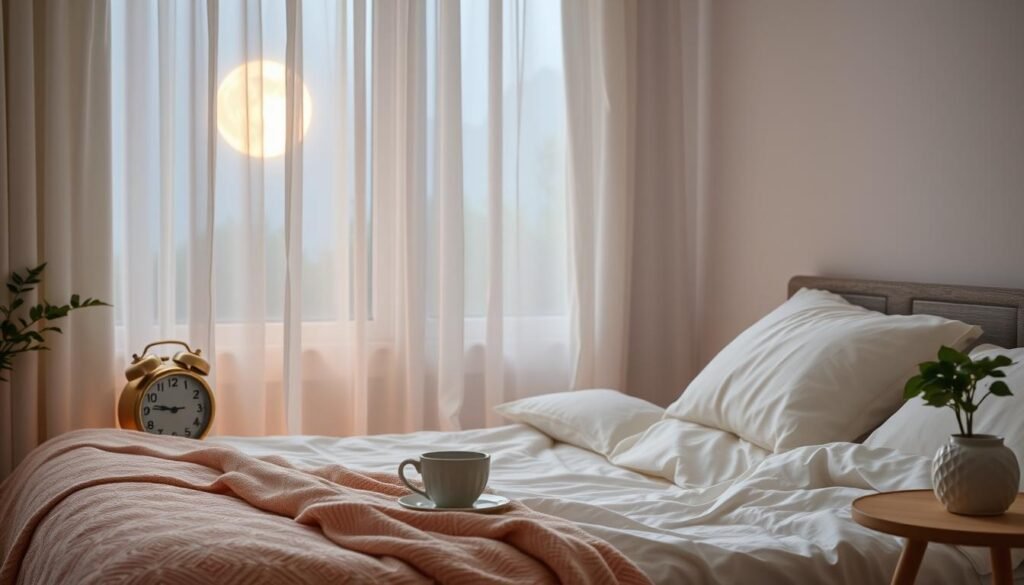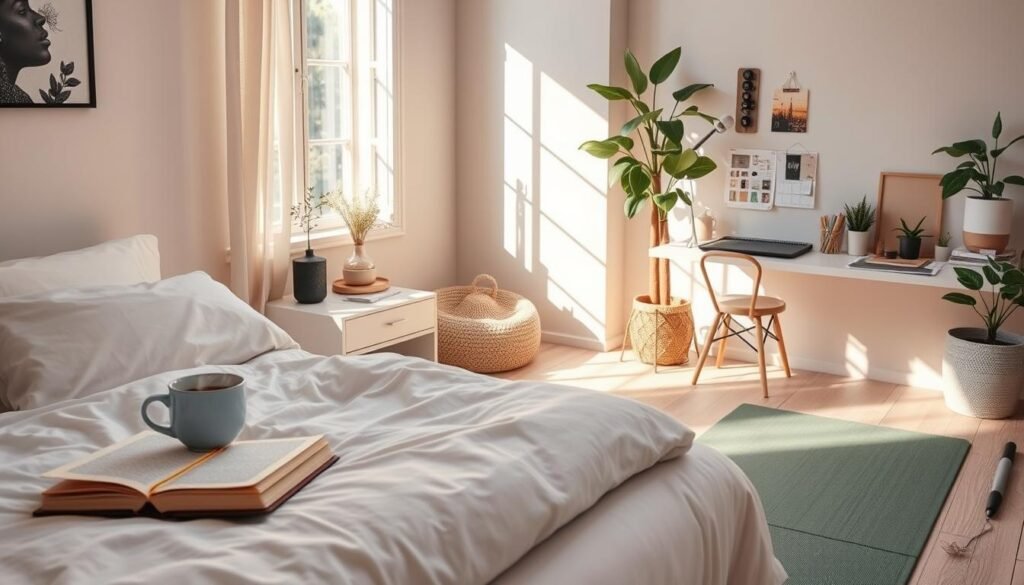About 2.8% of U.S. adults face bipolar disorder each year. This often brings manic anxiety with it. Finding effective anxiety relief strategies is crucial. While the numbers can be daunting, there are real ways to help. This article will cover various methods to cope. It aims to empower those dealing with manic anxiety to find peace and stability.
Key Takeaways
- Approximately 2.8% of adults in the U.S. face bipolar disorder annually.
- Recognizing patterns in mood swings can aid in managing manic anxiety.
- Support from loved ones significantly enhances coping strategies.
- Establishing a balanced lifestyle contributes to mood stabilization.
- Long-term commitment to coping mechanisms is vital for sustaining mental health.
Understanding Manic Anxiety
Manic anxiety means having extreme anxiety that messes with daily life. It’s important to know the symptoms and causes. This makes it different from other anxiety disorders. People with this condition feel very scared, think too fast, and can’t sit still.
The cause of this anxiety can be genetics or stressful events. It often goes hand in hand with bipolar disorder. In fact, more than half of those with bipolar disorder also get anxiety. Panic disorder is common among them. This shows how vital treatment for anxiety is.
Anxiety doesn’t actually cause mania. But, when someone is manic, they can feel very stressed. This stress might lead to anxiety. Studies show anxiety is common before and after manic times. Not being able to sleep well can also make anxiety worse. Knowing this helps in getting the right mental health care.
Dealing with manic anxiety needs special care. It’s good to find a therapist who knows about anxiety and bipolar disorder. They can really help improve someone’s life.
Common Triggers of Manic Anxiety
Managing anxiety means knowing the common anxiety triggers. Many things can make anxious feelings worse. Stressful places like tough jobs or messy homes can make you feel on edge. This can lead to feeling more anxious.
Big life changes can cause stress, too. Things like getting a new job, moving, or getting married can bring about pressure. These events might make you feel unsure and scared. This fear can make anxiety go round and round.
Not solving conflicts can make anxiety worse. It can make you keep thinking about hard times instead of fixing them. This way of thinking can make you feel trapped when stressed. It can make managing anxiety even harder.
Things like not having enough money or being sick also trigger anxiety. When life feels shaky, it’s easy to feel out of control. This worry can lead to more anxious moments. Knowing what makes anxiety worse is key to handle it better.
Recognizing Symptoms of Manic Anxiety
Knowing the signs of manic anxiety is key for handling it well and staying mentally healthy. Those affected can experience mental and physical symptoms like racing thoughts, non-stop worry, and trouble doing day-to-day tasks. They might also feel very restless and have trouble sleeping, and their eating habits could change, causing more stress.
About 50% of people with bipolar disorder also have anxiety disorders. These symptoms can really lower a person’s life quality. Other common signs include a fast heartbeat, a lot of sweating, and feeling sick to their stomach. Knowing what to watch for helps people take steps to manage their mental health better.
It’s very important to recognize symptoms and get help quickly. Finding resources like support groups or therapy can make managing anxiety more effective. Techniques such as deep breaths or exercise can lessen symptoms and bring peace. Being aware and getting help are key in dealing with manic anxiety well.
| Symptom Type | Mental Symptoms | Physical Symptoms |
|---|---|---|
| Common Symptoms | Racing thoughts, excessive worry, agitation, insomnia | Rapid heartbeat, excessive sweating, nausea |
| Associated Disorders | Anxiety disorders, bipolar disorder | Digestive issues, muscle tension |
People with these signs should look into treatments that work. Getting professional help can offer specific ways to better recognize and manage manic anxiety and related conditions.
Coping Strategies for Manic Anxiety
Finding the right ways to cope with manic anxiety is crucial. These strategies bring relief during hard times and boost well-being. Key methods include deep breathing, mindfulness, and physical activity for lasting relief.
Deep Breathing Techniques
Deep breathing helps calm your mind and ease panic. It involves taking slow breaths in through the nose, pausing, and then breathing out slowly through the mouth. This shifts you from a state of high alert to relaxation, easing anxiety quickly.
Mindfulness and Meditation Practices
Mindfulness and meditation are great for those with manic anxiety. By focusing on the now, you can stop racing thoughts in their tracks. With daily practice, you’ll handle stress better and adapt more easily.
Physical Exercise as a Relief Method
Exercise is key in fighting anxiety. Even a short, 10-minute walk can help as much as a longer workout. It boosts endorphins, lifting mood and health.
Making exercise a regular habit can deeply improve your mental health. WebMD offers more tips on managing manic anxiety.

Managing Diet to Alleviate Anxiety
A good diet is key to reducing anxiety. Eating right improves your mental state and mood. It targets anxiety symptoms directly. Choosing healthy foods leads to better emotional balance.
Importance of a Balanced Diet
For those fighting anxiety, a balanced diet is crucial. It brings mood stability and builds mental strength. Eating well fights inflammation, often linked to anxiety. This focuses on eating foods rich in nutrients.
Foods That Boost Mental Health
Certain foods show promise in boosting mental health. For instance, salmon, with omega-3s like EPA and DHA, helps lower anxiety levels. Eating vitamin D-rich foods, like fatty fish, can fight mood disorders too.
- Salmon: Eating salmon has been shown to reduce anxiety more than other meats.
- Dark chocolate: It’s connected to fewer depression symptoms and a better mood.
- Almonds: They’re linked to less depression. Eating more nuts can mean less anxiety.
- Chamomile: Taking 1,500 milligrams daily significantly cuts generalized anxiety disorder symptoms.
- Probiotic yogurt: It’s shown to improve anxiety and stress levels in postmenopausal women.
| Food Item | Main Benefits | Associated Nutrients |
|---|---|---|
| Salmon | Reduces anxiety | Omega-3 Fatty Acids (EPA, DHA) |
| Dark Chocolate | Improves mood | Antioxidants, Magnesium |
| Almonds | Decreases depression | Healthy Fats, Vitamin E |
| Chamomile | Reduces anxiety symptoms | Flavonoids |
| Probiotic Yogurt | Enhances mental health | Probiotics |
Choosing nutrient-rich foods over processed and sugary ones helps anxiety. These changes improve physical and mental health. They show the value of a good diet for mental wellness.
The Role of Sleep in Anxiety Management
Good sleep is crucial for managing anxiety, especially if you’re dealing with manic anxiety. People with bipolar disorders often struggle with sleep. This can make their anxiety worse. So, focusing on better sleep is a key step in handling anxiety disorders.
Sleep Hygiene Tips
To improve sleep quality and lessen anxiety, follow these sleep hygiene tips:
- Establish a regular sleep schedule by going to bed and waking up at the same time every day.
- Create a restful environment: ensure your bedroom is dark, quiet, and cool.
- Avoid screens at least an hour before bedtime to reduce blue light exposure.
- Limit caffeine and alcohol intake, especially in the evening.
- Incorporate a wind-down routine that allows for relaxation before sleep.
Understanding the Sleep-Anxiety Connection
Recently, more focus has been on how sleep and anxiety are connected. Poor sleep can increase anxiety levels. This makes sleep a vital part of maintaining mental health. Studies show that many people with bipolar disorder don’t sleep well. Up to 70% of them have insomnia. This lack of sleep can worsen anxiety and mood stability.
This table shows how sleep issues affect people with bipolar disorder:
| Statistic | Percentage/Value |
|---|---|
| Patients with insomnia | 70% |
| Suicide completion risk | 1 in 5 |
| Lifetime prevalence of bipolar I and II | 1% and 0.5% |
| Sleep disturbance during manic episodes | 69-99% |
| Patients experiencing hypersomnia during inter-episode | 25% |
| Risk of relapse within five years | 73% |

Limiting Alcohol and Caffeine
Reducing alcohol and caffeine can majorly help manage anxiety, especially if you have manic anxiety. Alcohol might seem like a quick fix to stress. But in the long-term, it can actually make anxiety worse. This is because it messes with your mood stability, which is risky for anyone with anxiety issues.
Caffeine also majorly impacts anxiety. Drinking too much can trigger manic episodes in people with bipolar disorder. For example, consuming more than 600 mg of caffeine a day can ramp up anxiety and mood problems. So, the International Bipolar Foundation says cutting down caffeine can help keep your emotions in check.
Plus, caffeine can mess with anxiety medications. It’s a diuretic, which can lower blood lithium levels. Lithium is key for mood stability in bipolar patients. Caffeine also makes sleeping hard, and good sleep is crucial for handling anxiety and keeping mood stable.
Even though a little caffeine can boost your mood, too much can increase anxiety. This is especially true for people sensitive to caffeine. The FDA suggests staying below 400 mg of caffeine daily. Yet, for those with manic anxiety, even less might be better.
Establishing a Routine for Stability
Creating a structured daily routine helps improve anxiety stability. It gives a sense of control, which is helpful during hard times. By having a routine, individuals know what to expect and can handle their days better.
The Importance of Structure in Daily Life
A set schedule helps manage mood swings in manic anxiety. Studies show that routines are key for mental health. They help in managing stress and anxiety. Having specific times for waking up, eating, and doing activities ensures tasks get done. This reduces stress and helps develop healthy habits.
It also makes you focus better and increases productivity. For those with bipolar disorder, a daily routine can stabilize moods for longer. Research suggests sticking to a schedule reduces depressive and manic episodes. Plus, routines allow for fun activities, which aid emotional health.
Setting Small Achievable Goals
Adding small, achievable goals into your routine boosts confidence. It makes you feel accomplished. This is crucial for handling overwhelming feelings during manic cycles. Simple goals, like completing morning routines or short exercises, make a big difference.
Planning tasks, like doctor appointments at specific times, reduces stress. For instance, aiming for appointments between 11 a.m. and 3 p.m. avoids heavy traffic. Achieving these goals keeps a positive mindset, especially after tough mood swings.
Routines should also have time for friends, exercise, and hobbies. Prioritizing relaxation and connection helps manage anxiety well. For more tips on everyday routines, check out this resource.

Seeking Mental Health Support
Getting help for manic anxiety is very important. You need to be active in seeking mental health support. Therapists and experts provide vital skills. These skills help you handle your anxiety better.
The Importance of Professional Help
There are many types of professional help. This includes therapy, medication, or both. Your regular doctor can check your mental health first. Then, they can send you to a specialist. Online resources from places like SAMHSA and CMS help find the right help. For those with insurance, it’s important to know what your plan covers. This ensures you can get local support easily.
Creating a strong support network is key for mental health. Friends, family, and groups offer much-needed understanding. This support is crucial for facing anxiety’s challenges. Colleges and workplaces often have mental health services. They provide support groups or personal help. DBSA also offers groups where people can meet and share experiences. This can be in-person or online.
Tools like the Wellness Wheel and Tracker from DBSA are very helpful. They support individuals in improving their mental health. Asking for help shows strength and caring. Having people who support you brings hope. This is very important for better health and happiness.
Exercising Self-Care
Self-care is key for good mental health and fighting anxiety. It’s tough for some people to make self-care a priority. But simple activities can make a big difference for your well-being. Moving your body is great for easing stress and enhancing your health, which helps you stay positive.
A share of Canadians with mood or anxiety issues don’t exercise to help manage their condition. This is 51.0% of them. It’s vital to encourage physical activities for better mental health care. On the flip side, 25.3% exercise four or more times a week. They see benefits like less anxiety and more resilience.
Being active helps fight off anxiety naturally. Research shows more activity means less chance of feeling depressed. Getting advice from doctors makes people more likely to work out. Yet, issues like not having enough time or motivation can stop them. We need ways to overcome these barriers to support mental health better.
Making fun activities part of your day can improve self-care practice. Try hiking, yoga, or just a calm walk. These can help a lot with self-care for anxiety. Exercise and mental health go hand in hand. So, making working out a priority is good for lasting health.
Active self-care helps manage anxiety. Adding exercise to daily life builds habits for better mental and emotional health. This creates a positive loop of good feelings.
For tips on using exercise to handle anxiety, check out this resource.
Developing Healthy Coping Mechanisms
Managing stress and tackling manic anxiety is vital. It involves knowing what sets off your anxiety. Then, finding the best ways to relax and deal with stress.
Getting creative through journaling, art, or music is a great method. These activities let you express yourself and process feelings in a positive way. Relaxation techniques like deep breathing or muscle relaxation are also helpful.
Being consistent is key. It takes time to build new, healthy habits. But, sticking with your chosen methods makes them more effective. This boosts your confidence. Getting help from a professional can also be very important.
- Identify personal triggers to better prepare for stressors.
- Engage in creative activities for emotional expression.
- Practice relaxation techniques for immediate stress relief.
- Seek guidance from therapists to discover effective strategies.
- Remember that developing healthy coping mechanisms requires persistence.
Avoid unhealthy ways of coping, like using drugs or alcohol. They can lead to addiction. Instead, focus on healthier options. This way, you can handle stress better. And you’ll live a more balanced and rewarding life.
| Healthy Coping Mechanisms | Benefits | Examples |
|---|---|---|
| Creative Outlets | Facilitates emotional expression | Journaling, painting, playing music |
| Relaxation Techniques | Reduces immediate stress | Deep breathing, meditation, progressive muscle relaxation |
| Professional Support | Provides personalized strategies | Therapy sessions, psychiatric consultations |
| Routine Establishment | Creates stability in daily life | Daily schedules, setting small goals |
Overcoming Manic Anxiety
Dealing with manic anxiety isn’t one-size-fits-all. You need a plan that fits your needs. Working on lasting strategies is key for feeling better and handling urgent worries. Learning ways to ease anxiety helps tackle the real issues, not just what you feel on the surface.
A lot of people with bipolar disorder also deal with anxiety. It’s important to spot the signs and figure out how to get better all-around. Knowing what sets off your anxiety, like panic or repeating thoughts, can make a big difference.
- Mental distraction techniques to shift focus from anxious thoughts.
- Following a structured routine which provides stability.
- Practicing grounding exercises to remain present.
- Developing self-soothing strategies that facilitate relaxation.
- Challenging anxious thoughts with factual information.
- Seeking support from friends, family, or professionals.
When you’re dealing with both anxiety and bipolar disorder, life gets better. Finding the perfect mix of managing your mood and anxiety matters a lot. Having people around who care can make you stronger. It helps you keep moving forward in fighting anxiety.
| Common Anxiety Disorders | Prevalence in Bipolar Disorder |
|---|---|
| Panic Disorder | 13% to 60% |
| Posttraumatic Stress Disorder | Up to 60% |
| Generalized Anxiety Disorder | Varies, closely linked with BD |
| Obsessive-Compulsive Disorder | Around 10% |
Finding a way to beat anxiety with bipolar disorder needs a special plan. It’s a team effort with your doctors, following their advice to see real change. Working together is key for the best results.
Conclusion
Dealing with intense anxiety can be tough. This article showed many ways to help manage it and improve your mental health. It talked about using routines, mindfulness, and changing what you eat. These steps help reduce anxiety and give you more control over your mental well-being.
Getting support for mental health is very important. You can get help from professionals, therapy, or friends and family. Research shows that people do better when they actively take part in their mental health care. This not only helps you feel better but also improves your relationships and life quality.
Understanding your anxiety, knowing what triggers it, and using coping strategies are key. By using these methods and talking openly about mental health, you can lead a happier life. There is hope for tackling anxiety. Taking the first step towards getting help can make a big difference.